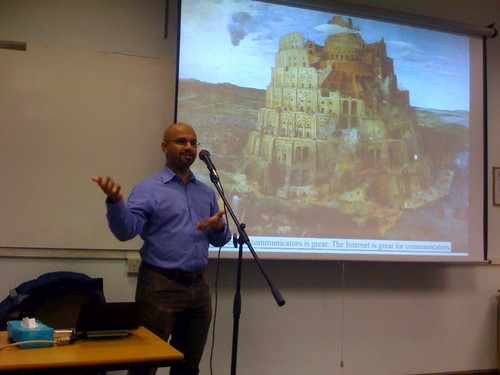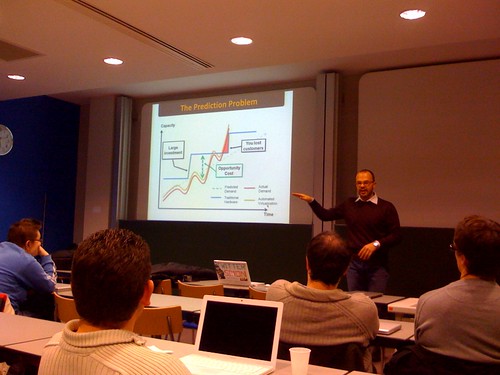Dr Mohammed Al-Ubaydli from Patients Know Best came to talk to the Cambridge Refresh group this evening. Patients Know Best is a startup which aims to help patients make use of their ‘Personal Health Record’ – a copy of which can be requested by anyone from their doctor under data protection laws.
The idea is that the management of a patient’s health should be a partnership between the patient and their doctor, and that anything the patient can do to help their doctor must be a good thing. People should take some kind of responsibility for their own illnesses.
One example Mohammed gave of this working is where a patient may spot something in their own record that their doctor has missed – after all, doctors are jolly busy people, and mistakes and oversights do happen. The patient isn’t doing the doctor’s job for them, just providing a second pair of eyes.
It turns out that there is a huge amount going on in both the UK and the US with patients using their access to their records to research their conditions and provide support to each other through social networks and other means. One of the jobs Patients Know Best is doing is collecting all this stuff together, onto a wiki. This is not only useful stuff to be doing, but also good marketing, of course. Patients Know Best could become synonymous with this kind of social use of medical records.
Patients Know Best are developing a software package to enable patients and doctors to communicate better through the web. My understanding is that it will allow patients to access their records electronically and then discuss the details with their doctor, without needing to make an appointment, thus saving everyone time. Mohammed is looking for people: to act as beta testers and to offer their services to the startup – principally Java-savvy developers at this stage.
You can see Mohammed’s slides on Google Docs.
Below are the notes I made during the talk – there may well be inaccuracies and falsehoods amongst the typos – if you spot any do let me know in the comments. I’ve tried to add as many links in as I can to help make the notes as comprehensible as possible…
- Communication is crucial in chronic diseases
- Patient has time to learn about your condition
- Patient has less than 1 hour with specialist per year
- Lots of different people work together with patients
- Patient knows more than anyone about their personal circumstances
- Why don’t more people use the web to communicate about their condition? 1. Security risks around digital data; 2. Issues around consent and data protection act; 3. What if the right person doesn’t get access to the information they need (eg doctors seeing patient records); 4. Not knowing that you can communicate, or how you can communicate
- 3 key questions for your clinician: 1. What are we doing; 2. Why are we doing it; 3. What happens if we don’t do it?
- Get a copy of your personal health record – you can’t know what is going on without it
- Patientslikeme.com – takes the view that you are safer the more people know about your situation – also rareshare.org (treat such open sites with a little caution)
- Patients’ access to PHRs is a Lutheran revolution – everyone should have access and understanding
- Having understanding of your notes make medicine participatory not paternalistic
- You can check your records and possibly spot something that busy doctors might miss (is this treating a symptom rather than the actual disease in the system?!?)
- More private tools: MyFamilyHealth, healthecard, PAERS, t+medical, healthspace
- Rareshare – social network for people with rare diseases. Sharing of experience and stories. Clinicians also use it to learn (US based)
- Patientslikeme – connect with similarly ill people and share knowledge, experience etc. Learning from peers rather than those in ‘authority’ (US based?)
- Harold Shipman – got away with it by faking records, not possible if publicly available. Elimination of distrust
- PAERS – access records through web interface
- Healthecard – carry your records around on a USB card, very private (UK)
- Healthspace – you put your own info on it. Good system but isolated from NHS records.
- Think positive (vodafone backed?) Records home monitor data (couldn’t find a link within 2 minutes so got bored)
- MyFamilyHealth (Cambridge based) Plot family tree with illness history. GenSeq backed – they use DNA samples to provides details of health risks etc also. Provides tailored health information – which drugs would work best for you, etc?
- 3G doctor – phone based. Video phone consultation for £35 after you have given them details of your problem/history etc. Phone back after 24 hours so have time to consider. (I find this worrying)
- Lots of information about all these services at podcast.patientsknowbest.com also on the wiki
- PatientsKnowBest is developing software to provide communications link between patient and doctor to help explain the patient record and what it means
- How are ‘official’ NHS initiatives liaising with this stuff?
- Obama to put medical records online?
- Currently 3 electronic medical records system providers in UK, not many of which work properly
- UK Gov has set data standards – should all match – HL7
- Role of Google Health, Microsoft Health Vault etc – use CCR data standard (better?) – also US based so data protection issues with EU etc
- What about digital divide – those with access, time and money to do this stuff. Are people without the skills etc really going to get involved, will they be left behind? 2 tier health service?
- Involvement of support groups, third sector, community groups etc
- Issue of insurers and employers accessing details of medical history – possibly a concern
- Mohammed is looking for beta testers and people interested in helping out with the project – UK & then US focused to begin with
- Tolven Java based is the software for the medical record software
- Starting with genetic immune deficiencies, then diabetes, asthma etc





